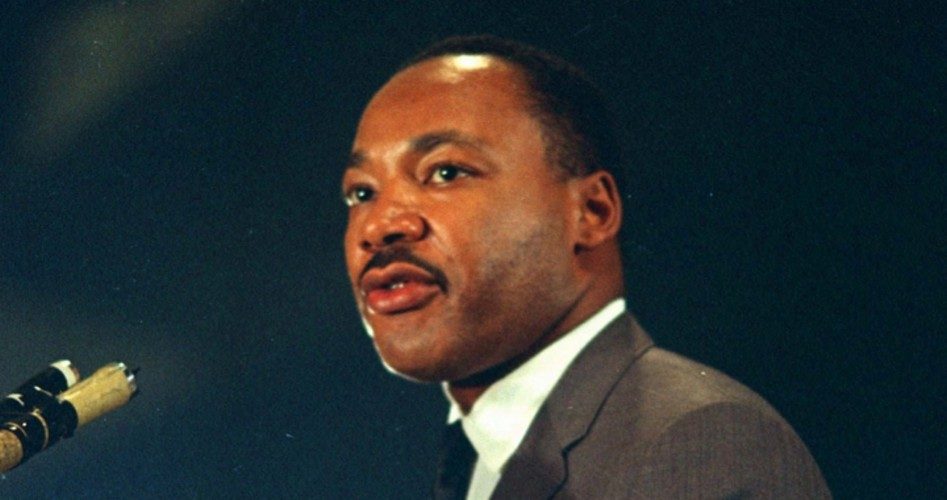
David Garrow, who won the Pulitzer Prize for his laudatory 1987 biography of the late Martin Luther King, Jr., Bearing the Cross, is now exposing the contents of some FBI surveillance tapes that could permanently tarnish King’s image. The British magazine Standpoint is publishing Garrow’s full investigation in its June edition — out this Thursday — but today The Sunday Times reported on Garrow’s upcoming article and its revelations based on FBI files.
While it has long been known that King was not faithful to his wife, Coretta, and the tapes confirm that, the most shocking thing about the tapes — not due for release from the National Archives until 2027 — is a tape of King documenting that he “looked on and laughed” as a pastor friend raped a parishioner.
Garrow told Standpoint that the files could lead to a “painful historical reckoning” for King, who was the most prominent figure in the Civil Rights movement in the 1950s and 1960s. According to an FBI document cited by Garrow, King and a fellow minister, Logan Kearse (pastor of the Cornerstone Baptist Church in Baltimore), were taped in the historic Willard Hotel, located near the White House, in 1964, discussing which women among their congregations would be most suitable for both natural and unnatural sex acts.
“When one of the women protested that she did not approve,” the document reads, “the Baptist minister (Kearse) immediately and forcefully raped her,” while King is alleged to have “looked on, laughed and offered advice” during the rape.
Other tapes reveal that King told a woman reluctant to engage in an unnatural sex act that performing the act “would help your soul.”
If it were a conservative writer making such claims about King, those claims would likely be dismissed by the liberal establishment opinion cartel, but Garrow is anything but conservative. He has written for the New York Times, The Nation, and The New Republic, none of which is a conservative publication. He has also written a book defending the U.S. Supreme Court Roe v. Wade decision and a laudatory book on former President Barack Obama. His award-winning biography on King was very favorable.
Garrow is also a member of the Democratic Socialists of America.
On another tape, King allegedly is heard to joke that he was the founder of the International Association for the Advancement of P***y-Eaters, according to Garrow.
Then-FBI Director J. Edgar Hoover ordered the surveillance of King, citing concerns that King had links to the Communist Party in the United States, and may have been doing their bidding to cause social unrest. Garrow explained to Standpoint that the FBI planted transmitters in two lamps in hotel rooms King used in January 1964. FBI agents were allegedly in the next room when the woman was raped, but chose not to intervene.
In the fall of 1963, then-Governor Meldrim Thompson of New Hampshire wrote to President Ronald Reagan, urging him to veto any bill creating a national holiday for King. Reagan responded, “I have the reservations you have, but here the perception of too many people is based on an image, not reality. Indeed, to them, the perception is reality.”
The image and perception of King is of a man who opposed affirmative action, believing in equality of opportunity, and not government quotas. And all through non-violence.
Although it should be admitted that King was a man of great courage, exceptional organizational skills, and a powerful orator, a review of his life reveals that the image Americans now have of him is not reality.
Perhaps this misperception derives from his famous, “I Have a Dream” speech, delivered by King in Washington, D.C. in August 1963. Hardly any conservative American would find any of the speech objectionable, especially when King declared, “I say to you today, my friends, so even though we face the difficulties of today and tomorrow, I still have a dream. It is a dream deeply rooted in the American dream…. I have a dream that my four little children will one day live in a nation where they will not be judged by the color of their skin but by the content of their character.”
Despite King’s noble and stirring rhetoric (no doubt drawing upon his background as a Baptist preacher), the reality is that he was no libertarian, dedicated to the free enterprise system. He called for “restructuring of the whole of American society,” specifically questioning the “capitalistic economy.”
Living in an era when black radicals such as Stokely Carmichael, Malcolm X, and others did call for violence to achieve social equality in American society, King appeared much more moderate.
When asked by a reporter if he agreed with the accusations some had made that King was a communist sympathizer, President Reagan responded, “We’ll know in about 35 years, won’t we?” — referencing the time when he thought the files on King would be released. Actually, it was in 1977 that the FBI surveillance files on King were sealed — for 50 years. So, in 2027 we should know what is in those documents concerning King’s alleged association with communists, as well as his sex exploits.
Julian Bond, a former chairman of the National Association for the Advancement of Colored People (NAACP), said in 2010 that the person whom Americans celebrate on the third Monday of January is not the real Martin Luther King, Jr., but rather an “anesthetized” version of the man.
“We’ve transformed him into a cut-leaf figure, someone who had a dream and spoke those magnificent words, but we don’t remember the King who was a critic of capitalism,” adding that King favored a “modified form of socialism” for the United States.
In the “Me-Too” Era, perhaps King’s abusive language about women, even to the point of allowing a rape to happen right in front of him, will tarnish his image to the point where it will be politically “safe” to discuss the radical side of the man. While we can and should nod agreement that every individual should be judged not by the color of his skin, but rather by the content of his character, we should also be able to assess the character of the man who made that statement. Fortunately, Garrow’s revelations may make it possible that we will not have to wait until 2027, as Reagan lamented, but that that reassessment can start now instead.
Photo of Dr. Martin Luther King: AP Images



